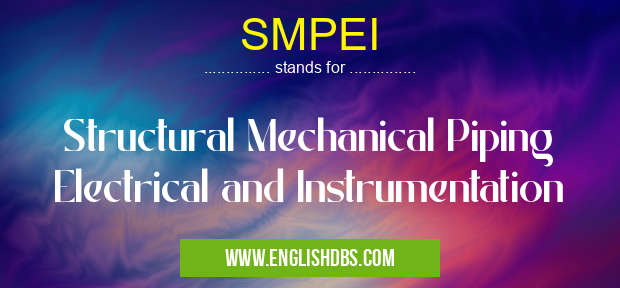What does SMPEI mean in ELECTRONICS
SMPEI stands for Structural Mechanical Piping Electrical and Instrumentation. It is a crucial aspect of engineering that involves the integration of various disciplines to design, construct, and maintain industrial facilities and infrastructure. SMPEI engineers are responsible for ensuring the safety, efficiency, and reliability of these systems.

SMPEI meaning in Electronics in Academic & Science
SMPEI mostly used in an acronym Electronics in Category Academic & Science that means Structural Mechanical Piping Electrical and Instrumentation
Shorthand: SMPEI,
Full Form: Structural Mechanical Piping Electrical and Instrumentation
For more information of "Structural Mechanical Piping Electrical and Instrumentation", see the section below.
Structural
- Involves the design and analysis of load-bearing structures, such as buildings, bridges, and towers.
- Ensures the stability and integrity of structures under various loads and environmental conditions.
Mechanical
- Deals with the design, analysis, and operation of mechanical systems, including heating, ventilation, air conditioning (HVAC), plumbing, and fire protection.
- Optimizes energy efficiency, comfort, and safety within buildings.
Piping
- Focuses on the design, installation, and maintenance of piping systems used to transport fluids and gases.
- Ensures the safe and efficient flow of fluids through pipelines, valves, and other components.
Electrical
- Involves the design, installation, and maintenance of electrical systems, including power distribution, lighting, and communication networks.
- Provides reliable and efficient power supply and controls for various equipment and processes.
Instrumentation
- Deals with the design, installation, and maintenance of instrumentation systems used to monitor and control industrial processes.
- Ensures accurate measurement and control of parameters such as temperature, pressure, and flow.
Essential Questions and Answers on Structural Mechanical Piping Electrical and Instrumentation in "SCIENCE»ELECTRONICS"
What is structural design in SMPEI?
Structural design in SMPEI involves the analysis and design of structural components such as beams, columns, and foundations to ensure the stability and integrity of mechanical, piping, electrical, and instrumentation systems.
What is mechanical design in SMPEI?
Mechanical design in SMPEI encompasses the design, selection, and installation of mechanical equipment and systems, including pumps, compressors, turbines, and heat exchangers. It considers factors such as performance, efficiency, and reliability.
What is piping design in SMPEI?
Piping design in SMPEI involves the design, layout, and installation of piping systems to transport fluids or gases. It includes the selection of pipe materials, pipe sizes, and routing to optimize flow and minimize pressure drop.
What is electrical design in SMPEI?
Electrical design in SMPEI covers the design, installation, and maintenance of electrical systems, including power distribution, lighting, and control systems. It ensures the reliable and safe operation of equipment and facilities.
What is instrumentation design in SMPEI?
Instrumentation design in SMPEI involves the selection, installation, and calibration of instrumentation devices, such as sensors, transmitters, and controllers. These devices monitor and control process variables, such as temperature, pressure, and flow, to ensure optimal system performance.
How are SMPEI disciplines integrated in project execution?
The disciplines of SMPEI are closely integrated throughout a project's lifecycle, from design to construction and operation. Cross-functional collaboration ensures that systems are designed and installed to work seamlessly together, meeting safety, performance, and efficiency requirements.
Final Words: SMPEI is a multidisciplinary field that combines expertise from various engineering disciplines. It plays a vital role in the design, construction, and maintenance of safe, efficient, and reliable industrial facilities and infrastructure. SMPEI engineers are highly skilled professionals who ensure the optimal functioning of these systems, contributing to overall productivity and sustainability.
